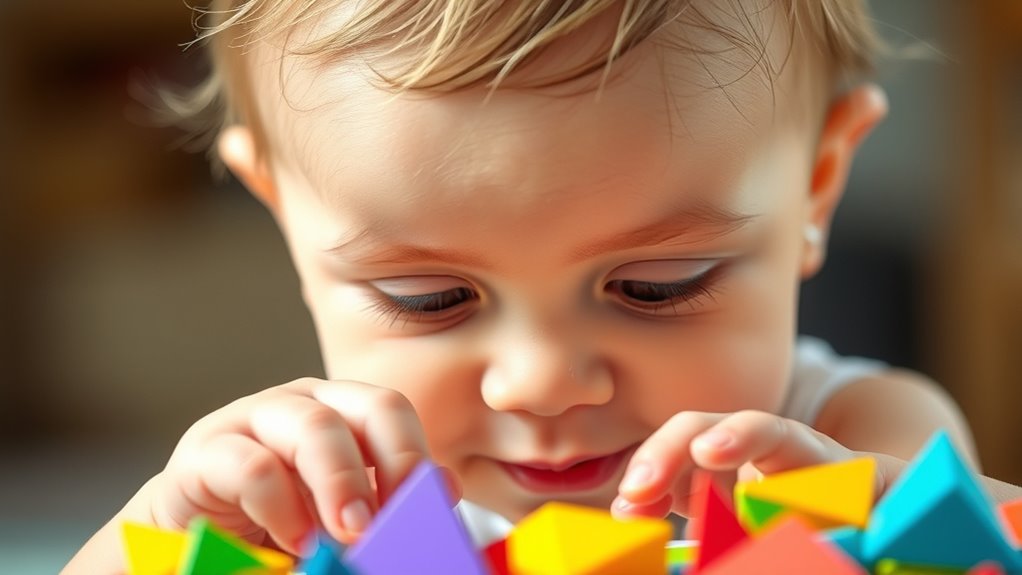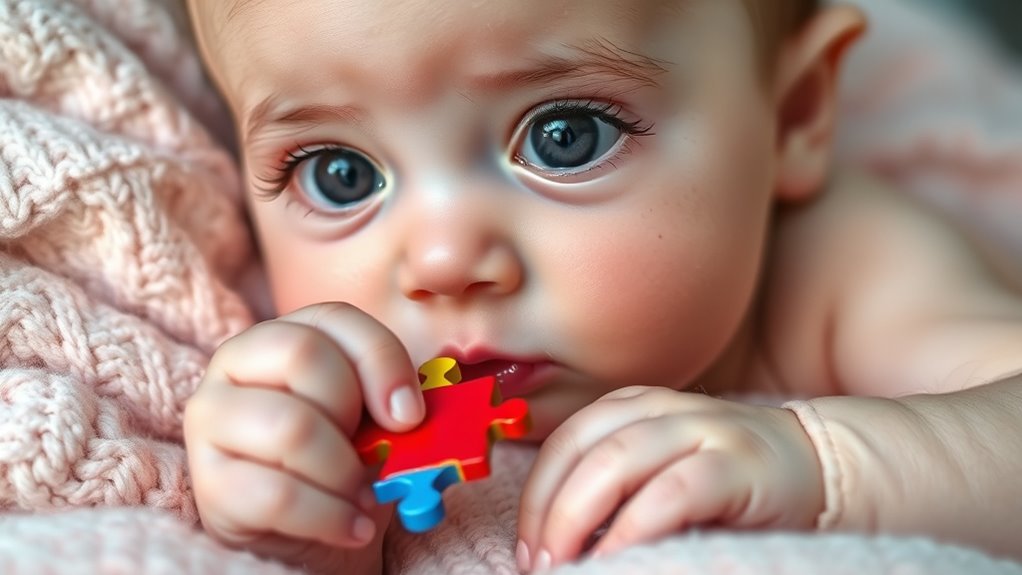If your baby shows signs of advanced development, you might notice they process information quickly, recognize objects or people early, and have an impressive memory for details. They may grasp concepts beyond others their age, prefer complex play like puzzles, and want social interactions with adults and kids. Early language skills, understanding emotions, and reacting strongly to stimuli also indicate giftedness. Keep observing these behaviors, as continuing your watch can reveal even more about your little one’s remarkable abilities.
Key Takeaways
- They process information quickly and recognize objects or people earlier than typical infants.
- They demonstrate advanced language skills, such as mimicking sounds and engaging in complex conversations early.
- They show heightened curiosity, fascination with specific subjects, and seek out social interactions with adults and peers.
- They exhibit intense emotional reactions and respond strongly to new stimuli or experiences.
- They grasp concepts beyond their age, demonstrate impressive memory, and prefer more challenging play activities.

Noticing the signs of a gifted baby can be exciting and sometimes surprising. From an early age, you might observe that your little one seems to process information faster or shows a keen curiosity about the world around them. These early clues often relate to brain development, which occurs rapidly during infancy. Gifted babies typically demonstrate advanced cognitive abilities, such as recognizing objects or people sooner than expected or showing an impressive memory for details. Their brains develop at an accelerated pace, allowing them to grasp concepts that are usually beyond their age group. You might notice they prefer puzzles, stacking blocks, or exploring new textures more fervently than other babies. This heightened brain development isn’t just about intelligence; it also influences how they interact socially. Recognizing these early signs can help you provide appropriate stimulation to nurture their natural talents.
Social skills often stand out early in gifted babies. You may see them seeking out interactions with adults or other children, displaying an unusual level of interest in conversations, or attempting to communicate even before they can speak. These babies often demonstrate advanced social awareness, such as understanding emotions or responding appropriately to facial expressions. They might seem more empathetic or curious about social dynamics, which can set them apart from their peers. Their ability to pick up on social cues often leads to more sophisticated interactions at a surprisingly young age. Because their brains are wired for quick understanding, they might also get frustrated if they don’t receive enough mental stimulation, which can sometimes manifest as fussiness or impatience.
It’s common to notice your gifted baby’s reactions to new experiences are more intense. They may get excited about a new toy or show deep fascination with a particular subject, indicating an advanced level of emotional and cognitive engagement. Their social skills, combined with rapid brain development, mean they often prefer more complex play and conversation than their age might suggest. You might also observe that they seem to grasp language earlier, often mimicking words or sounds before most infants begin talking. These early language skills, intertwined with their social awareness, help them connect more deeply with their environment. Recognizing these signs early can help you support their development by providing appropriate challenges and interactions, fostering their natural talents and emotional growth. Additionally, understanding Glycolic Acid benefits for skin can be useful if your child’s skin needs gentle exfoliation or care as they grow.
Frequently Asked Questions
When Should Parents Start Worrying About Their Baby’s Development?
You should start worrying about your baby’s development if they miss key developmental milestones or if parental concerns persist despite normal progress. While every baby develops at their own pace, significant delays in motor skills, speech, or social interactions may signal the need for professional advice. Trust your instincts, and consult a pediatrician if you notice consistent concerns, ensuring early intervention can support your child’s healthy growth.
Can Early Signs of Giftedness Vary Across Different Cultures?
Cultural perceptions greatly influence how you view early signs of giftedness, and developmental norms differ worldwide. What one culture considers advanced might be typical in another. You should recognize that these variations shape expectations, so don’t rely solely on your cultural lens. Instead, focus on your baby’s individual growth and consult professionals if you notice extraordinary abilities, understanding that giftedness can manifest differently across diverse cultural contexts.
How Can Caregivers Support a Gifted Baby’s Social Skills?
Did you know that gifted babies often excel socially early on? To support their social skills, try playdate strategies that encourage sharing and cooperation. Engage in emotional coaching by naming feelings and guiding appropriate responses. These techniques help your gifted baby develop empathy and communication skills, strengthening their interactions. By actively fostering social growth, you prepare them for meaningful relationships and ensure their emotional needs are met alongside their advanced development.
Are There Risks Associated With Overdiagnosing Giftedness Early?
You should be aware that overdiagnosis concerns exist because developmental mislabeling can lead to unnecessary stress or interventions. Overdiagnosing giftedness early might cause you to overlook your child’s unique needs or create unrealistic expectations. It’s important to observe their progress carefully and consult professionals for accurate assessments. By doing so, you guarantee your child gets appropriate support without the risks associated with premature labeling or misjudgment.
Do Gifted Babies Typically Develop Language Skills Faster Than Peers?
It’s quite the irony—you might expect gifted babies to hit language milestones faster, but that’s not always the case. While some do showcase advanced communication patterns early on, others develop language skills at a typical pace. Every baby’s unique, so don’t assume early language skills are a sure sign of giftedness. Focus on supporting their overall growth; early language development varies widely among bright little ones.
Conclusion
So, if you spot these signs of a gifted baby—sharp senses, swift speech, and super curiosity—you’re witnessing a wonderful wave of wonder. Trust your instincts and treasure their talents, as these tiny traits tend to blossom into big brilliance. Embrace their early enthusiasm, encourage their enthusiastic exploration, and enjoy this exciting journey of joyful discovery. Remember, nurturing your newborn’s natural nuances now nurtures a future filled with fabulous, flourishing feats.










